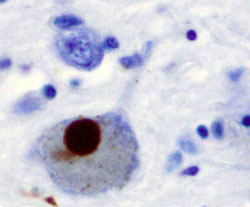
Subscribe & Follow
Advertise your job vacancies
Jobs
- Head: Customer Support Johannesburg
- Clinical Cosmetic Support Researcher Cape Town
Study provides first link between two major Parkinson's genes
As Parkinson's Awareness Month gets underway, a Canadian-led international study is providing important new insight into Parkinson's disease and paving the way for new avenues for clinical trials.

Dr. Schlossmacher and his colleagues have found the first link between the most common genetic factors for Parkinson’s disease and the hallmark accumulation of a protein called alpha-synuclein within the brains of people with the disease. Image shows alpha-synuclein stained in brown in the brain of an individual with Parkinson’s. (Image: Wikimedia commons)
The study, led by Dr. Michael Schlossmacher in Ottawa, provides the first link between the most common genetic risk factor for Parkinson's and the hallmark accumulation of a protein called alpha-synuclein within the brains of people with Parkinson's. It is published in the most recent edition of the journal Annals of Neurology.
"This study addresses a major riddle in Parkinson's disease," explains Dr. Schlossmacher, who holds the Canada Research Chair in Parkinson's disease at the Ottawa Hospital Research Institute and the University of Ottawa, and is also an active neurologist at The Ottawa Hospital. "Thanks to pioneering research done by geneticists in the United States and Israel, we've known for six years now that 10-12% of people with Parkinson's have a mutation in one copy of a gene called glucocerebrosidase, or GBA. However, until now we have not understood how these mutations contribute to the disease and how they fit with other pieces of the puzzle, such as the accumulation of alpha-synuclein in the brain."
Likened to the 'bad cholesterol' of Parkinson's
Alpha-synuclein has been likened to the "bad cholesterol" of Parkinson's because it gradually accumulates in the brain as Parkinson's progresses. Affected brain cells show signs of injury, and when they die, this leads to the tremors, stiffness and slowness that are typically associated with Parkinson's disease.
Using a series of experimental laboratory models, Dr. Schlossmacher and his colleagues have now shown that the GBA mutations found in Parkinson's patients prevent brain cells from efficiently breaking down and removing alpha-synuclein.
"While the GBA mutations don't cause Parkinson's disease on their own, they do significantly increase the risk of developing the disease, probably by making people susceptible to the accumulation of alpha-synuclein," says Dr. Schlossmacher. "This could explain why people with GBA mutations frequently develop Parkinson's symptoms four to five years earlier than those without them."
Exciting findings
"These findings are particularly exciting because if they are confirmed by other researchers, they could significantly accelerate the development of new treatments for Parkinson's," he adds. "Several companies have developed or are actively working on drugs that target GBA for another disease called Gaucher disease, and our research suggests that these drugs could potentially be useful in Parkinson's, and in a related disease called Lewy body dementia."
In addition to researchers in Ottawa, this study also involved researchers from Brigham & Women's Hospital at Harvard Medical School (where the Schlossmacher team first began to explore the link), Genzyme Corporation, Cincinnati Children's Hospital Medical Centre, Christian-Albrechts University and Purdue University. It was funded by the Canada Research Chairs Program, The Ottawa Hospital Department of Medicine, the Michael J. Fox Foundation, the National Institutes of Health (USA), and Genzyme Corporation.
One study in a series
This study represents just one in a series of important discoveries recently made by members of Ottawa's Parkinson Research Consortium (PRC). The group, which was founded in 2004 by Dr. David Park and Dr. David Grimes, includes 14 basic and clinical scientists from the University of Ottawa, the Ottawa Hospital Research Institute and the National Research Council.
Other recent PRC studies have focused on developing diagnostic tests for Parkinson's disease in biological fluids, identifying new genetic mutations associated with Parkinson's and delineating how the disease can be better modelled in the laboratory. PRC is supported by many generous donors in the community and organisation such as Partners Investing in Parkinson's Research (PIPR), The Ottawa Hospital Foundation and the Parkinson Society Ottawa, one of 10 regional Parkinson Society Canada partners. See www.ohri.ca/prc for details.
Source: Ottawa Hospital Research Institute







